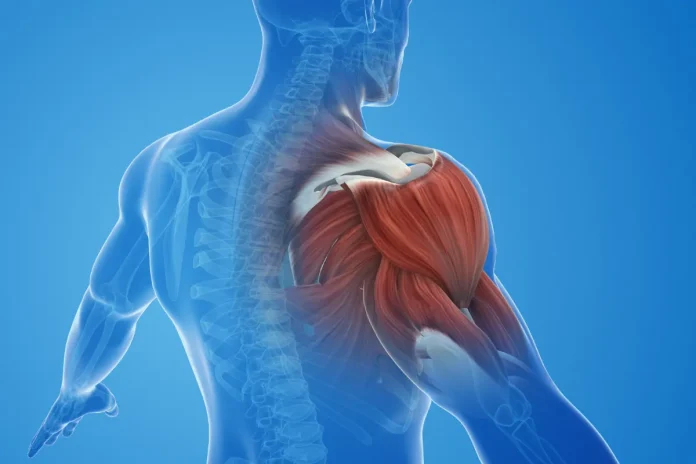
Do you feel tingling in shoulder blade? It’s a common issue. Sometimes it’s mild, but it can be uncomfortable. What causes this sensation? It could be nerve problems, injuries, or poor posture. Learning about its causes and treatment is important. Many shoulder discomfort solutions can ease this condition. How can you know what works best?
This blog will guide you in understanding and managing it. Keep reading.
What Is Tingling in the Shoulder Blade?
Tingling in the shoulder blade feels like pins and needles. It can happen suddenly or last for a long time. Often, it’s caused by pressure on nerves near the shoulder. Poor posture, injuries, or sleeping awkwardly can cause it. For some, it’s only a minor annoyance. But for others, it may signal something more serious. Understanding the feeling is the first step to finding relief. Be aware of your body and notice any unusual sensations.
Common Causes of Tingling in the Shoulder Blade
There are many reasons for shoulder tingling. Poor posture is a common cause. It puts extra strain on your back and shoulders. Carrying heavy bags or sitting at a desk too long may cause it. Injuries, such as muscle tears or bone fractures, can lead to tingling too. Nerve problems, like pinched or compressed nerves, are another cause.
These may happen due to slipped discs or swelling in nearby tissues. Infections, such as shingles, can sometimes irritate nerves and cause tingling. Overusing your shoulder muscles during sports or work might also contribute. Understanding these causes helps in finding the right solution. Talk to a doctor if you’re unsure about your symptoms or need more guidance.
How Poor Posture Affects Your Shoulder Blade
Sitting or standing the wrong way can harm your shoulder blade. Poor posture causes muscles to work harder than they should. Over time, this can lead to pain or tingling in the shoulder blade. Slouching at a desk or carrying a heavy backpack can make it worse. Good posture helps keep your back and shoulders healthy. Try to sit up straight and avoid leaning too much. Use posture tips for shoulder health to prevent these problems early.
Signs to Watch for With Tingling Shoulder Blade
Tingling might not always seem serious. But you should notice other signs too. Pain, weakness, or swelling near the shoulder are warning signals. Tingling that spreads to your arm or hand is another sign. Muscle stiffness, a feeling of tightness, or difficulty moving the shoulder could also point to issues. If you experience numbness alongside tingling, it might indicate nerve damage. Unusual sensations, like burning or sharp pain, should not be ignored. If the feeling gets worse at night or during certain activities, that’s another clue to take seriously. Early treatment can help prevent bigger problems. Keep track of what you feel and when it happens. Knowing your symptoms is key to recovery and staying healthy.

Home Remedies for Tingling in the Shoulder Blade
Simple fixes can often help ease tingling. Rest is a good first step. Avoid activities that worsen the tingling.
Stretching exercises can relax tight muscles and improve blood flow. Try gentle shoulder rolls or neck stretches to reduce tension. Heat or ice packs may reduce discomfort too.
Use a warm towel or an ice pack for 15 minutes. Massage is another great option for relief. A professional massage or even a self-massage can loosen tight muscles. Make sure to take breaks if you sit a lot. Stand up, stretch, and move around regularly. Sleeping on a supportive pillow can improve your posture while you rest.
Staying hydrated and eating healthy foods also helps muscles and nerves recover. Good posture and a healthy lifestyle can prevent future problems. Trying these shoulder discomfort solutions can make a big difference over time.
When to See a Doctor
Not all tingling needs medical attention. But sometimes, it’s a sign of something serious. If the tingling doesn’t improve or gets worse, seek help. Pain that spreads or muscle weakness could mean nerve damage. A doctor can check for underlying problems like injuries or nerve issues. They may suggest physical therapy or medication. Don’t ignore symptoms that last too long. Early care leads to better results.
Exercises to Prevent Shoulder Tingling
Regular exercises can keep your shoulder blade healthy. Stretching daily helps reduce tension in muscles and nerves. Focus on movements that strengthen your shoulders and back. Yoga and light weightlifting are great options. Avoid exercises that cause sharp pain. Always warm up before starting any activity. Remember to cool down afterward too. Staying active improves your posture and overall health. These exercises are easy to include in your routine. They can prevent tingling in the shoulder blade before it starts.
How Stress Contributes to Tingling
Stress affects your body in many ways, including tingling. When you’re stressed, your muscles tighten. This can press on nerves, causing discomfort in your shoulder blade.
Relaxation techniques like deep breathing can help. Meditation or taking short walks can also reduce tension. Managing stress is just as important as physical care. Find what works best to keep your mind and body relaxed. Less stress means fewer chances of tingling sensations.
Tools and Devices That Help
Many tools can help relieve shoulder discomfort. Foam rollers and massage balls ease tight muscles. Ergonomic chairs and desk setups improve posture at work. Heat wraps or pads can relax the area around your shoulder. Tens units are devices that send small electrical pulses to reduce pain.
Websites like Tensunits.com offer great resources for these tools. Find what works best for your needs and use it regularly.
Learn More About Tingling in Shoulder Blade
Tingling in shoulder blade might seem small at first. But it can grow into a bigger problem if ignored. Early care and good posture tips for shoulder health are important. Stretching, stress management, and proper tools make a big difference. If the tingling persists, seek help from a doctor. Listen to your body and notice changes early. Healthy shoulders mean a healthier, happier life. Keep learning and practicing to prevent future problems.
Did you find this article helpful? If so, check out the rest of our site for more informative content.
FURTHER READING









